Jonesborough Historic District
|
Jonesborough Historic District | |
 | |
|
Main Street, part of the Jonesborough Historic District | |
 | |
| Location | Jonesborough, Tennessee |
|---|---|
| Coordinates | 36°17′35″N 82°28′24″W / 36.29306°N 82.47333°WCoordinates: 36°17′35″N 82°28′24″W / 36.29306°N 82.47333°W |
| Area | 120 acres (49 ha) |
| Architect | Multiple |
| Architectural style | Queen Anne, Greek Revival, Federal |
| Governing body | Local |
| NRHP Reference # | 69000183[1] |
| Added to NRHP | December 23, 1969 |
The Jonesborough Historic District is a historic district in Jonesborough, Tennessee, that was listed on the National Register of Historic Places as Jonesboro Historic District (reflecting the spelling of the town name at the time) in 1969.
Staff of the Tennessee Historical Commission surveyed 158 buildings in the town in 1969 and found 72 worth preservation.[2] The district includes Queen Anne architecture, Greek Revival architecture, and Federal architecture among its 72 contributing buildings over a 120-acre (49 ha) area.[1]
Some contributing buildings include the Jonesborough United Methodist Church, which was built in 1847 and renovated in 1945 and 1959; the Washington County Courthouse, built in 1913 on the site of the first courthouse of the county; and the Chester Inn, which was first built circa 1797.[2]
The district is an irregularly shaped area, roughly bounded by College Street on the north, the junction of Main Street and Franklin Avenue on the east, Depot Street on the south, and 3rd Avenue on the west.[1][2]
Architectural styles
There are very few examples of the pure classical style in Jonesborough. However, buildings in the district can be divided into at least six different primary styles, although they all exhibit characteristics of one or more secondary styles. Examples include the following.
Federal
Some of the oldest buildings in Jonesborough are built in the Federal style. The form of this period is basically Georgian, often with crow-stepped gables (also known as corbie steps). Most of the brick work is Flemish bond.
- Chester Inn
- Listed separately as a National Historic Place, the Chester Inn is a three story rectangular building, including the raised stone basement. Built in 1797, the west section of the building has a two story kitchen. The dining room was built circa 1836, in the east addition, and the Italianate front porch was added in 1883.
-

Chester Inn, looking west, 116 W. Main Street, West end built 1797 and east end built circa 1836
-
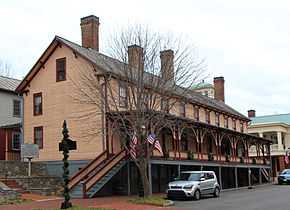
Chester Inn, looking east
-
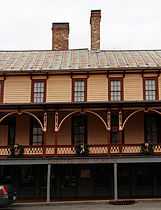
Chester Inn, looking north. The join between the original 1797 building and the 1836 addition is visible in roofline between the two mis-matched chimneys
-
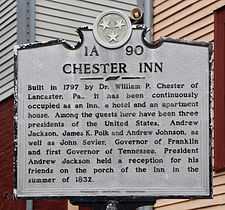
Chester Inn Plaque
- Sister's Row
- Sometimes incorrectly referred to as House of the Three Sisters, Sister's Row was built by Samuel D. Jackson as a home for his three daughters. Constructed of hand-molded bricks on a stone foundation, the two-story building is rectangular with an ell. The porches are historic additions.
-
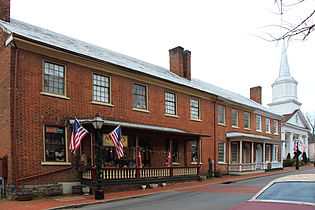
Sister's Row, looking west, 205-209 W. Main Street, built 1821
-
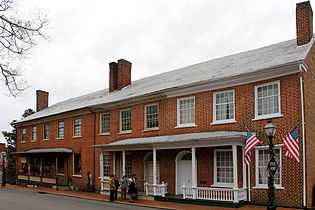
Sister's Row, looking east
- Green's Mansion
- The Green's Mansion was built by John Green, farmer and real estate agent. It is a two story, rectangular building, with an ell. The front porch is the only one that represents the Federal Style. The foundation is stone.
-

122 E. Woodrow Ave., built circa 1815
- Old Jonesborough Female Academy
- This building was used as a school until 1852. The building is one story, and made of brick. It is rectangular with an ell addition in about 1854. The original part of the house was a one room school with a small side room. The porch was added in circa 1890.
-

Old Jonesborough Female Academy, 205 W. College Street, built circa 1834
- Jacobs House
- As of 1969 it was known as the Jonesborough Bed and Breakfast. The house is rectangular in shape. Foundation is stone. The porch is located on the second level.
-

Jacobs House, 106 E. Woodrow Avenue, built circa 1831
- Gammon-Moss House
- This house is three stories and has a rectangular shape with a one story addition to the east side of the house, built about 1900. Foundation is brick and siding brick. The roof shape is gable with corbiesteps.
-

Gammon-Moss House, 204 E. Main Street, built circa 1830; Federal style with Greek Revival influences
- Blair-Moore House
- The historic name is the Old Blair House. As of 2014 it is a bed and breakfast. It is two stories of an irregular shape. The foundation is brick with circa 1870 penciling. The roof shape is gable with corbiesteps.
-

Blair-Moore House, 201 W. Main Street, built circa 1830; Federal style with Greek Revival influences
-

Blair-Moore B&B
Greek Revival
Corbie steps also appear in Jonesborough Greek revival buildings. Most of the porches on Greek Revival homes appear to have been added long after the buildings were constructed.
- Methodist Church
- Listed separately as a National Historic Place, the Methodist Church is two stories with a rectangular shape. The foundation and siding is brick. The roof shape is gable. The building has a pedimented portico, with four Ionic columns. It has stained glass windows. There is an educational wing added in the mid 1800s. The steeple was constructed in circa 1890, and replaced an earlier one. The original slave gallery remains.
-
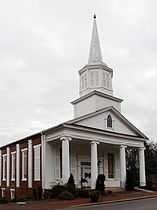
Methodist Church, 211 W. Main Street, circa 1845
-
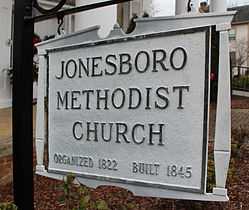
Methodist Church
- First Baptist Church
- The building is two stories and has a rectangular shape. The foundation and siding are brick. The steeple is weatherboarded and has brackets and openings capped by Gothic arches. The building has stained glass windows. An educational wing was added in about 1940. In 1960s a two story educational wing was added.
-

Baptist Church, 201 E. Main Street, circa 1840
- Jonesborough Presbyterian Church
- The building is two stories with a rectangular shape. The foundation and siding is brick. The roof shape is gable. Triglyphs and dentils are in the frieze. The building has a pedimented portico on the second story with fluted columns. A two story educational wing was added to the rear of the building in the mid 1900s.
-
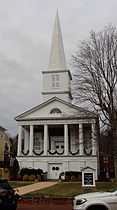
Presbyterian Church, 126 W. Main Street, circa 1845
- Cunningham House
- The building is two stories and is rectangular in shape with a two story ell. Foundation is brick and siding is brick. The porch was added in about 1895.
-

Cunningham House, 119 W. Main Street, circa 1840
- Febuary Hill
- Now known as the Dossett Residence, the building is two stories and is rectangular in shape with a two story ell. Foundation is brick and siding is brick. The porch is two story Greek Revival. The building has 9/9 windows on the first level and 6/9 windows on the second. There is an enclosed sunroom on the west side of the ell and a terrace on the east side of the ell; there is a front stoop and balusters, all added in about 1965.
-

Febuary Hill, 102 W. College Street, circa 1840
- Walter Sherfey Home
- The building is two stories and is rectangular in shape with a two story ell. Foundation is brick and siding is brick. It has a porch that spans three-fourths of the façade and has square columns on the bases. It has 8/8 windows.
-

Walter Sherfey Home, 402 W. College Street, circa 1850
- Shipley House
- Now known as the Shipley-Bledsoe House, the building is two stories and is rectangular in shape with a two story ell. Foundation is brick and siding is brick. The sides have a brick dentil trim, in contrast to paneled frieze on front and west façades. The porch covers all four of five bays (does not include the first left bay) and has turned wood posts and balustrade. There are sidelights and transoms with bull's-eyes and fluted colonettes around entries.
-

Shipley House, 100 E. Woodrow Avenue, circa 1848
- Mansion House
- The building is two stories and is rectangular in shape with a two story ell. Foundation is brick and siding is brick. The façade is Flemish bond. The roof shape is gable corbiesteps. The porch on the second level is Italianate. Thie building has 12/12 windows.
-

Mansion House, looking west, 200 W. Main Street, built 1849 with Federal influence
-
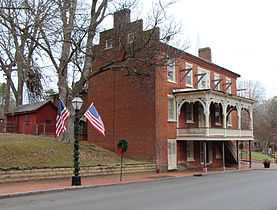
Mansion House, looking east
Victorian Period
This period includes styles of Italianate, Gothic Revival, and Queen Anne. This style did not come to Jonesborough until around the Civil War. The Italianate style is very common, especially shown in porches.
- Johnson or Range House
- This house is rectangular in shape with a two story ell. Foundation is brick and siding is brick. The roof shape is hip with gablets. There are large dentils under the eaves of the roof.
-
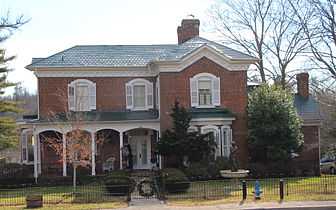
Johnson or Range House, 421 W. Main Street, built 1880
- Holston Baptist Female Institute
- Also known as the Old Dungen School, the building is Italianate. The building is two stories and has an irregular shape. The foundation is stucco on brick and the siding is brick. The roof shape is hip. The porch dates from about 1910 and is Colonial Revival. There is also a Colonial Revival porch on the back. 12/12 windows date from about 1910.
-

Holston Baptist Female Institute, 233 E. Main Street, circa 1855
-
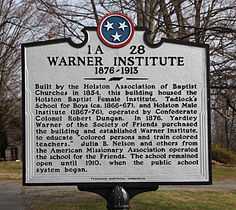
Holston Baptist Female Institute Plaque
- May-Dishner House
- Originally the Humpston House was on this parcel, constructed circa 1800. The form of the present building, built about 1905, is gabled ell with Queen Ann influence. It is two stories with an irregular shape. The foundation is brick and the siding is weatherboard with patterned wood shingles in the gable. The building has 1/1 and 12/12 windows. Copies of the Manumission Intelligencer and Emancipator were printed in a print shop on this parcel, perhaps the first periodicals in the United States exclusively dedicated to the abolition of slavery.
-
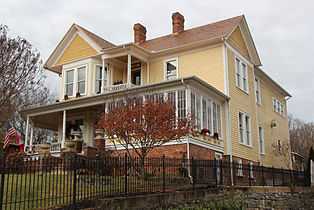
May-Dishner House, 130 W. Main Street, built circa 1905
-

Manumission Plaque
- Old Deadrick House
- Also known as Poplar Hill, it is now known as the Thatcher Residence. The style of the building is Gothic Revival. The building is two stories and has an irregular shape (the floor plan is in the form of a cross with a steep gabled half octagon two-story front bay). The building has 6/6 windows. The foundation is brick and the siding is brick.
-

Old Deadrick House, 102 N. Cherokee, built 1878
- Residential House
- The style of the building has Italianate and Queen Ann influences. The building is two stories and has an irregular shape (with two-story octagonal bay on front and rectangular bay on side). The foundation is brick and the siding is brick. The porch is on all four sides of octagonal bay with a section that wraps right and which is glassed in. Ornamentation on the house consists of sawn brackets, sawn woodwork in starburst patterns in porch gable and over windows, chamfered columns and sawn wood arches, and small brick arches over windows.
-
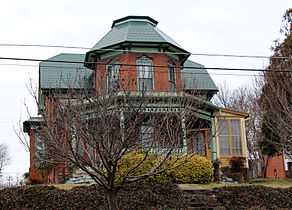
Residential House, 314 W. Main Street, built circa late 1860's with Italianate and Queen Anne Influences
- Hacker House
- The style of the building has Italianate and Queen Ann influences. The building is two stories and has an irregular shape. The foundation is brick and the siding is brick.Heavy metal drip moldings over openings, shallow segmental arched windows, bay windows with dentils and brackets, sawn porch woodwork and brackets are ornamental features.
-
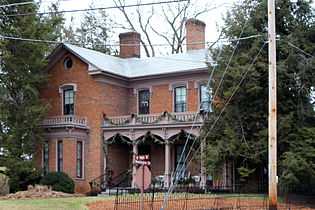
Hacker House, 400 W. Main Street, built 1869
Post Victorian/Neoclassical Period/Classical Revival
- Washington County Courthouse
- The current building is on the site of the first courthouse built in Washington County, in 1779. Its form is Classical Revival. The building is two and one half stories and has an irregular shape. The foundation is concrete and the siding is brick. The Classical Revival style porches have Ionic columns.
-

Washington County Courthouse, 100 Courthouse Square, built 1913
-

Washington County Courthouse Plaque
-
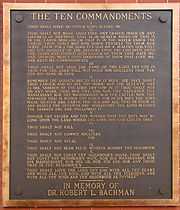
Washington County Courthouse Plaque
- Academy Hill
- Originally the Old Jonesboro High School, it is now condominiums. Style of the building is Classical Revival. The building has three levels and has a rectangular shape. The foundation is concrete and the siding is brick. The portico covers the front center and has classical columns. The building has 6/6 windows.
-
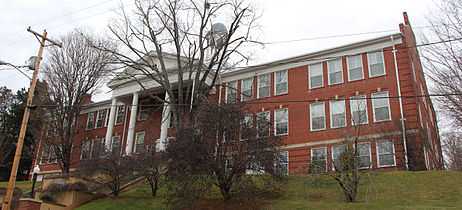
Academy Hill, 312 W. Main Street, built 1926
-
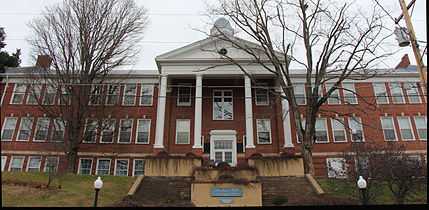
Academy Hill, facing north
Bungalow
- Residential House
- The building is one and one-half stories and has a square shape. The foundation is brick and the siding is brick.
-

Old Clyde Haws House, 108 Oak Grove Ave, built 1933
- Residential House
- The building is one and one-half stories and has a square shape. The foundation is brick and the siding is asbestos shingle.
-
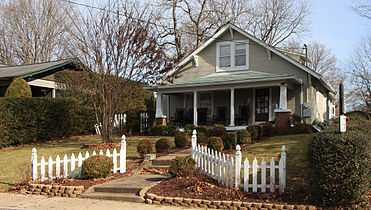
Residential House, 102 Oak Grove Ave, built circa 1920
Minimal Traditional
- Residential Buildings
- The form of the buildings are I-house with Greek Revival influences. The buildings are two stories. The foundation are brick and the siding is weatherboard.
-
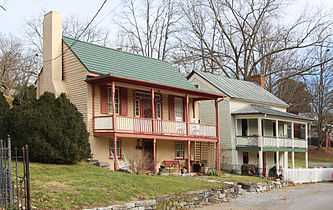
Residential Buildings, 105/107 Spring Street, built circa 1850 with Greek Revival influences
Other Architectural Styles
- Mail Pouch Building
- The building is two stories and has a rectangular shape. The foundation is brick and the siding is brick. The painted advertisement is from the early 1900s. The present façade is 1920s textured brick.
-
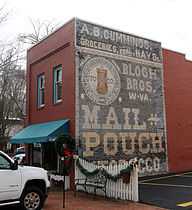
Mail Pouch Building, 104 S. Cherokee Street, built 1888; architecture is two-part commercial block
- Christopher Taylor House
- The building was moved from its original site to this location in the 1970s. It is two stories. The foundation is stone and the siding is log.
-
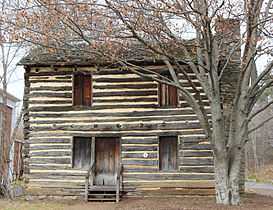
Christopher Taylor House, 118 Main Street, built circa 1778; log cabin
-

Christopher Taylor Plaque
References
- ↑ 1.0 1.1 1.2 "National Register Information System". National Register of Historic Places. National Park Service. 2009-03-13.
- ↑ 2.0 2.1 2.2 Lawrence, Stephen S. (July 23, 1969). "National Register of Historic Places Inventory - Nomination Form: Jonesboro Historic District". National Park Service. Retrieved November 10, 2014. and 29 photos
External links
![]() Media related to Jonesborough, Tennessee at Wikimedia Commons
Media related to Jonesborough, Tennessee at Wikimedia Commons
| ||||||||||||||||||||||||||